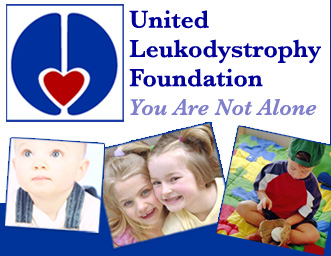

|
|

Shop Online While Giving to ULF:
Mission Statement: The United Leukodystrophy Foundation is dedicated to helping children and adults who have Leukodystrophy and assisting the family members, professionals and support services that serve them. The ULF is committed to the identification, treatment and cure of all leukodystrophies through programs of education, advocacy, research and service.
Latest ULF News
Peroxisome Assembly Disorders Meeting
April 18th, 2009
DeKalb, Illinois
2009 26th ULF Scientific Symposium and Family Conference
July 16th - 18th 2009
DeKalb, Illinois
VISIT OUR: LEUKODYSTROPHY SUPPORT COMMUNITY 
The ULF has always encouraged a sense of family, support, belonging and communication. To further extend that philosophy, the ULF has partnered with the online community network Team Inspire to provide a mechanism for patients, caregivers and physicians to communicate in a common online forum for Leukodystrophy support.
The Inspire community breaches a wide range of health related communities and felt that the ULF was a good fit for the community. The Inspire community provides several mechanisms for communicating with the members. There are blog pages where individuals can post their daily thoughts. There are discussion topics that members can start and get into a dialog with other members. There is also individual messaging capability to send messages to a single community member.
We feel that the Inspire community is another positive step in that direction and we encourage everyone who can, to join the ULF Inspire community. Membership is completely free and it only takes a few moments to sign up and become a member.
We hope that this will allow for a wider communication network and foster even more communication outside of ULF meetings and other conferences. Click the link above or on the left to get started now.


FOR IMMEDIATE RELEASE
February 12, 2009
Contact: Mary Dunkle
mdunkle@rarediseases.org
(203) 744-0100 (office)
(203) 942-6443 (cell)
(Danbury, CT)-----The last day of February has been designated as worldwide “Rare Disease Day” to call attention to the public health issues associated with rare diseases, which affect nearly 30 million Americans and countless others around the world. “People with rare diseases remain a medically underserved population in every country,” said Peter L. Saltonstall, president of the National Organization for Rare Disorders (NORD), which is sponsoring Rare Disease Day in the U.S. “This day is intended to bring together the patients and families with rare diseases to discuss the need for greater awareness, more research, and better access to diagnosis and treatment.”
More than 200 organizations, institutions and companies have signed on as “Rare Disease Day Partners” in a U.S. coalition supporting the special observance. The coalition, being coordinated by NORD, includes patient organizations, professional societies, government agencies, medical researchers, and pharmaceutical and biotechnology companies.
Rare Disease Day activities in the U.S. will include a nationwide network of online videos, patient stories and blogs; newspaper, radio, and television reports; state and municipal proclamations; a Rare Disease Hall of Fame for researchers; and other activities designed to raise awareness of what it means to have a rare disease.
A rare disease is one that affects fewer than 200,000 Americans. According to the National Institutes of Health (NIH), there are nearly 7,000 such diseases affecting nearly 30 million Americans. “People with rare diseases often face challenges that occur less frequently with more common diseases,” Saltonstall said. “These include delay in getting an accurate diagnosis, few treatment options, and difficulty finding medical experts. Many rare diseases have no approved treatment, and insurance may not cover treatments that aren’t approved. Medical and social services may be denied because those making the decisions are not familiar with the diseases. Also, treatments for rare diseases tend to be more expensive than treatments for more common diseases.”
In 1983, the Orphan Drug Act was passed by Congress to create financial incentives for companies to develop treatments for rare diseases. Since then, nearly 330 “orphan” (for rare diseases) drugs and biologics have been approved by the U.S. Food and Drug Administration (FDA). FDA estimates that from 11 to 14 million Americans benefit from these products. However, that still leaves more than 15 million Americans with diseases for which there is no approved treatment.
Rare Disease Day also will highlight the unique partnership that exists among the patient community, government entities such as the NIH Office of Rare Diseases and FDA Office of Orphan Products Development, medical professionals, researchers, and companies developing orphan products.
Although this is the first Rare Disease Day observance in the U.S., it is the second globally. The concept was launched in Europe last year by the European Rare Disease Organization, EURORDIS, a sister organization to NORD. This year, Rare Disease Day also is being observed in other parts of the world, including Canada, Australia, and China. The plan is to have a global Rare Disease Day on the last day of February each year.
NORD, a federation of individuals and patient organizations, was established in 1983 by the patient leaders who worked to get the Orphan Drug Act passed. It provides advocacy in Washington, DC, on behalf of the rare disease community; research grants and fellowships; educational services for patients, the public, and medical professionals; and patient assistance programs.
For more information about Rare Disease Day activities in the U.S., go to NORD’s website (www.rarediseases.org). For information about the global observance, go to www.rarediseaseday.org).
![]()
November 18, 2008
Shire Human Genetic Therapies (HGT) announced its research program for Globoid Cell Leukodystrophy (GLD). The program is in preclinical development (animal studies), and has thus far completed studies performed in twitcher mice. These results were presented earlier this month at the 2008 American Society of Human Genetics (ASHG) meeting in Philadelphia (Abstract #263). If the results from further studies in other GLD animal models are promising, the company may move forward with the development of a clinical program in humans.
At this point, given the early nature of the research, it is too early to say if and when clinical trials in GLD patients could begin, but any studies in humans would likely be two to three years from now. This timeline is based on a number of required activities including; completing additional animal model studies; scaling up the manufacturing process for the protein to ensure that there will be enough material for clinical trials; performing the necessary Investigational New Drug (IND) toxicology studies; and filing and IND application with the FDA.
While there is a lot of work ahead. Shire is excited to embark on this important research as it aligns perfectly with our stated mission to develop innovative therapies for rare genetic diseases.
Shire is a leading specialty biopharmaceutical company that focuses on serving specialist physicians and their patients through distinctive medicines and effective education programs. The Shire Human Genetic Therapies business unit focuses on researching, developing and commercializing therapies for rare genetic disorders such as Fabry disease, Hunter syndrome (MPS II) and Gaucher disease. To learn more, please visit www.shire.com
GINA signed into Law
FOR IMMEDIATE RELEASE
MAY 21, 2008
For More Information Contact:
Sharon Terry – sterry@geneticalliance.org or 202.966.5557 x201 Iris Maldonado – imaldonado@amplifypublicaffairs.net or 202.263.2580
President Bush Signs Landmark Genetic Nondiscrimination Information Act Into Law
Washington, D.C. – May 21, 2008 – The Coalition for Genetic Fairness (http://www.geneticfairness.org/) commends President George W. Bush for signing into law today the first civil rights legislation of the new millennium, the Genetic Information Nondiscrimination Act (GINA). GINA is the first and only federal legislation that will provide protections against discrimination based on an individual’s genetic information in health insurance coverage and employment settings.
“This is a tremendous victory for every American not born with perfect genes – which means it’s a victory for every single one us,” said Representative Louise Slaughter (D-NY). “Since all of us are predisposed to at least a few genetic-based disorders, we are all potential victims of genetic discrimination.”
“Today marks the beginning of a new era in health care,” continued Slaughter. “Americans can finally take advantage of the tremendous potential of genetic research without the fear that their own genetic information will be used against them.”
Just a few weeks ago, GINA received overwhelming support in both the Senate, with a unanimous vote of approval, and the House of Representatives, where the legislation was passed by a landslide vote of 414-1.
”Individuals no longer have to worry about being discriminated against on the basis of their genetic information, and with this assurance, the promise of genetic testing and disease management and prevention can be realized more fully,” stated Sharon Terry, president of the Coalition and CEO of Genetic Alliance (http://www.geneticalliance.org/).“We applaud our champions on the Hill who have worked tirelessly to pass this important legislation. It is now our responsibility to make sure the public knows that these new protections are in place.”
The health insurance protections offered by GINA are expected to roll out 12 months after the bill is signed, whereas the employment protections will be fully realized in 18 months.
“Now that GINA has been approved and signed into federal law by the President, American health care consumers and employees will no longer have to fear the adverse effects of being tested to determine their risk status for genetic diseases,” said Joann Boughman, Ph.D., executive vice president of the American Society of Human Genetics (http://www.ashg.org/) and a member of the Coalition’s executive committee. “Once this legislation has taken effect, clinicians will be able to order genetic tests for patients and their families in a manner that ensures the full realization of the advantages of personalized medicine models, while easing patients’ concerns about the risk of genetic discrimination by insurance companies and employers based on this data.”
Specifically, the legislation protects against genetic discrimination by health insurers or employers by:
• Prohibiting group health plans and issuers offering coverage on the group or individual market from basing eligibility determinations or adjusting premiums or contributions on the basis of genetic information. They cannot request, require or purchase the results of genetic tests, or disclose genetic information.
• Prohibiting issuers of Medigap policies from adjusting pricing or conditioning eligibility on the basis of genetic information. They cannot request, require or purchase the results of genetic tests, or disclose genetic information.
• Prohibiting employers from firing, refusing to hire, or otherwise discriminating with respect to compensation, terms, conditions or privileges of employment. Employers may not request, require or purchase genetic information, and may not disclose genetic information. Similar provisions apply to employment agencies and labor organizations.
###
The Coalition for Genetic Fairness is an alliance of advocacy organizations, health professionals, and industry leaders working to educate Congressional policymakers about the importance of legal protections for genetic information and ensure passage of meaningful genetic information nondiscrimination legislation.
The Coalition for Genetic Fairness is led by: Genetic Alliance, Affymetrix, American Academy of Pediatrics, American Heart Association, American Society of Human Genetics, Brown University, Hadassah, National Society of Genetic Counselors, the National Workrights Institute and the PKD Foundation.
Coalition for Genetic Fairness • http://www.geneticfairness.org • 4301 Connecticut Ave. NW #404, Washington DC • 20008-2369 • Phone: 202.966.5557 • Fax: 202.966.8553
| Date modified |
Sycamore, Illinois USA
www.ulf.org
This website has been developed by:
MorningStar Media Group LTD.


